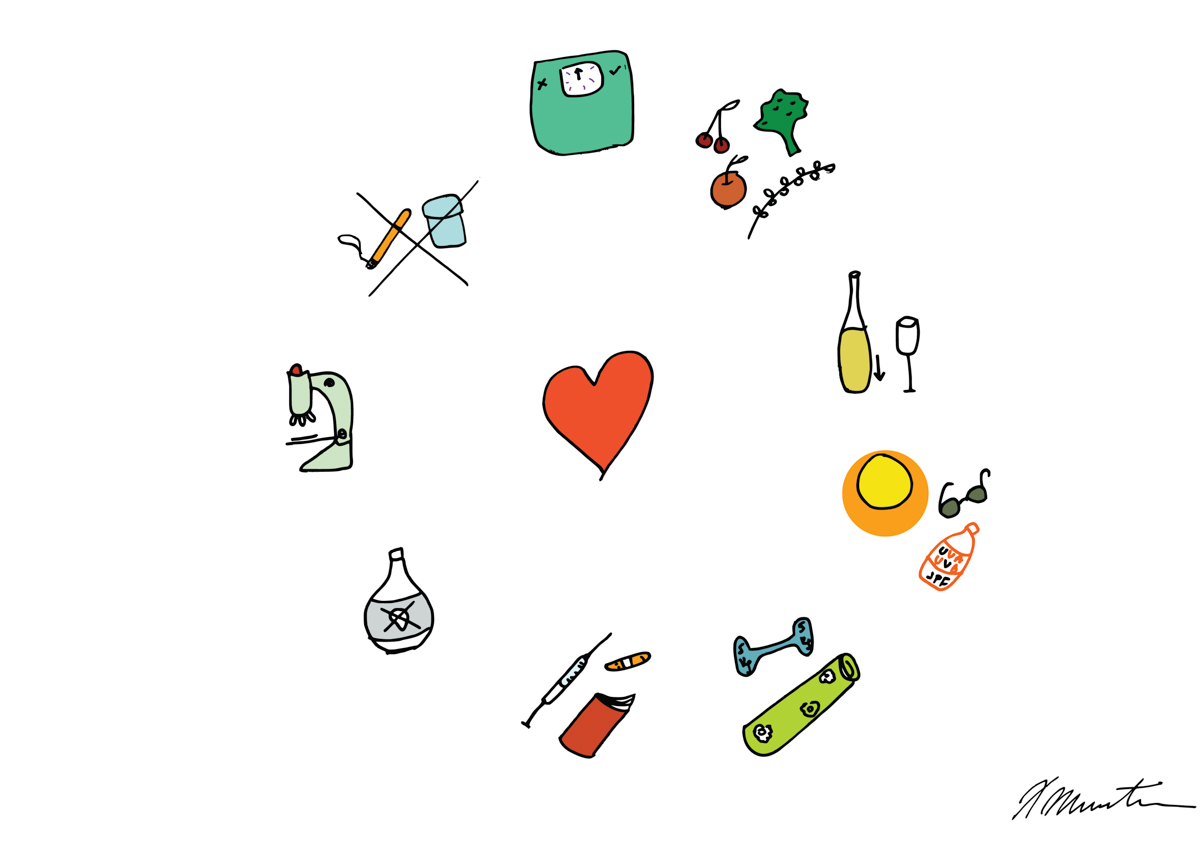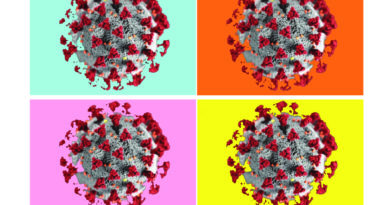Your Future Health and Cancer
We all make choices that alter our lives, such as moving abroad, changing jobs, or starting a family. When it comes to health, we all want to stay fit and well. But are we able to influence our future health?
Some people believe the choices we make today actively impact on our health tomorrow. Others believe serious illnesses like cancer are due to fate. Is cancer down to bad luck? Could cancer be prevented if we tried?
We know cancer can affect anyone. The World Health Organisation (WHO) estimated that 8.8 million people around the world died from cancer in 2015. Each year, 16,000 people die from cancer in Switzerland.
Cancer and genetics
Naturally, we worry that we are at high risk of getting cancer if anyone in our family has had cancer. Many of us are aware that certain cancers are more common if we inherit specific genes from our family. But the overall proportion of cancers that develop due to these inherited faulty genes is small – around two or three out of every 100 cases of cancer are thought to be inherited. The vast majority of cancers are not inherited. The well-known actress Angelina Jolie raised awareness of very specific inherited faulty genes closely linked to breast cancer in certain families. Looking at breast cancer as an example: most people developing breast cancer will have no family history1 of breast cancer.
How can cancer be prevented?
Study after study shows that cancer is avoidable. Perhaps surprisingly, preventing cancer is largely based on making lifestyle changes. This can be a challenging view for those who feel cancer is purely due to fate. At least 40% of cancers are preventable, i.e., four out of 10 cases of cancer could be prevented. The WHO goes further, saying that up to 50% of cancers could be preventable through healthy lifestyle choices.
Preventing cancer requires us to be self-aware, motivated, and willing to commit to lifestyle changes.
1) Not Smoking
Everyone knows that smoking is bad for health. Smoking increases your risk of getting several different types of cancer, particularly lung cancer, prostate cancer, and cervical cancer (cancer of the cervix). Chewing tobacco causes mouth cancer and cancer of the oesophagus (the food pipe or gullet). Second-hand smoke can also cause cancer in non-smokers.
2) Maintaining a healthy weight
Numerous types of cancer are more common if you are overweight or obese. This is increasingly worrisome as the population gets more and more obese. Your chance of developing some types of cancer gets stronger the more overweight you are. These include endometrial cancer (cancer of the lining of the womb), kidney cancer, gallbladder cancer, colon cancer, liver cancer, and breast cancer (note: the link between obesity and breast cancer applies to women after menopause). Despite there being strong links between obesity and getting cancer, many people are not aware of this relationship.
3) Eating well
What is healthy eating? The definition depends on whom you ask and the sources you consult. There isn’t a one-size-fits-all plan when it comes to eating well. In general, a simplified version of current advice suggests lots of whole grains, lots of fruit and vegetables, and reduced meat intake. Furthermore, include other protein sources (such as pulses, lentils, eggs), include oily fish, limit processed/cured meats, and limit high-fat dairy foods. Choose oils such as olive oil over hard fats such as butter, reduce high-fat/high-sugar processed foods such as sugary drinks, cakes, and biscuits; reduce salt intake, and drink plenty of water.
4) Reducing alcohol intake
Even low levels of regular alcohol (drinking 1.5 units2 per day) increase your risks of cancers, particularly breast cancer, cancer of the oesophagus, and cancers of the head and neck area. At higher levels of alcohol intake, liver cancer and bowel cancer become more common. Drinking alcohol is very much about personal choice and enjoyment for many people, and guidance about safe consumption levels are for information, rather than enforcement. Many people say they drink alcohol to protect their hearts. The beneficial effects of alcohol on the heart are debatable. Current evidence suggests there is a minor “healthy heart” benefit from alcohol, and this probably only applies if you never drink more than five units of alcohol spread out over a week, and are healthy in other ways (e.g., not overweight, don’t smoke).
5) Safe sun awareness
There is generally good awareness about the links between skin cancers and sun exposure. Sunbed use has also been shown to increase skin cancer risk, particularly when used in youth (below the age of 20).
Family history is important – around five to 10 percent of people who develop a melanoma (a skin cancer) have a family history of melanoma. Basic health insurance in Switzerland covers the cost of certain examinations for the early detection of disease. Skin examination is generally covered by basic insurance if you have a family history of melanoma.
6) Keep physically active
If you maintain regular high levels of physical activity, you will lower your risk of getting cancer, such as cancers of the liver, lung, stomach, endometrium, oesophagus, colon, and breast. The evidence looking at the benefits of exercise in preventing cancer came from a huge study which looked at people across Europe and the U.S. over a period of several years. You can find a bit more about physical activity in this article.
7) Getting vaccinated/avoiding certain infections
Around 15% of cancers are thought to be due to infections. We cannot vaccinate against all possible infectious agents that cause cancer but two infections that we can help protect against include:
HPV virus – The human papilloma virus (HPV) is sexually transmitted and is responsible for most cases of cancer of the cervix. There are vaccines available against HPV. Here is an excellent article about protecting against cervical cancer by Dr Michelle Wright.
Currently the HPV vaccine is offered free of charge if it is given within your canton’s vaccination programme for girls aged 11 to 14 years old. All cantons are currently reviewing their vaccination programmes, so please check to see what the current situation is your own canton. The aim is to get all girls and young women between the ages of 15 and 26 years old vaccinated as part of their canton’s vaccination programme by the end of 2017. Since July 2016, boys and young men aged 11 to 26 have also been included as part of their canton’s vaccination programmes. Again, please check what your own canton is currently doing.
Hepatitis B – This infectious virus can lead to liver damage and liver cancer. The vaccine can be given to people of all ages. The main focus in Switzerland is vaccination programmes for 11 to 15 year olds. Health insurance companies will cover the cost of hepatitis B vaccine if it is within your canton’s vaccination programme.
8) Being aware of work place and environmental hazards
We have less influence over the environmental pollution we are exposed to. Outdoor air pollution is known to contribute to deaths from cancer, particularly lung cancer. If you work in an occupation where there are cancer-causing substances, you may be at risk of “occupational cancers”. Chemicals used at work can cause lung cancer, bladder cancer, and mesothelioma (a type of cancer that affects the linings of body organs such as the lungs; usually due to asbestos exposure). Radiation (for example UV solar rays) is responsible for cancers, e.g., skin cancers. You should have special protection if you work with radiation. Although radiation is frequently used for investigations in medicine, these levels are carefully controlled. You can find out more here about radiation: www.cancer.gov/about-cancer/causes-prevention/risk/radiation
9) Take part in screening programmes
Depending on which country you lived in before moving to Switzerland, you may find the screening programmes here different to what you are used to. Screening is intended to pick up abnormalities in cells. It tries to pick up cancer early, i.e., before you experience any symptoms.
Cervical cancer screening – This is well established across Switzerland. A cervical screen test (smear test) is done as part of a routine examination by your gynaecologist. Your basic health insurance will cover you for one cervical screening test every three years (assuming the result comes back as normal). Your gynaecologist can still request more smears if you need testing more frequently than this.
Breast cancer screening – Switzerland does not have a national breast cancer screening programme using mammograms3. If your canton provides screening, women aged from 50 to 69 will get a mammogram every two years. If your canton does not have a breast cancer screening programme, you can still have a mammogram arranged but you will need to speak to your own doctor. Your health insurance company may only cover costs via basic health insurance if the mammogram is done via cantonally approved screening programmes, or if you are at a higher risk of developing breast cancer (e.g., if your mother, daughter, or sister has had breast cancer).
Colon cancer screening – This programme is one of the newer programmes in Switzerland. If your canton does this, it will be for those aged between 50 and 69. A sample of your stool (faeces or poo) is checked for blood every two years. You will have an urgent colonoscopy4 depending on the result of the stool test. If your stool sample is normal, you still get a colonoscopy every 10 years. Most of the costs are reimbursed via basic health insurance if you have these tests as part of your canton’s screening programme. Screening is also for those with higher risk of developing cancer of the colon and the rectum (based on family history).
Your canton – Want to know if your canton has a screening programme for breast cancer or for colon cancer? Have a look at the Swiss Cancer Screening website.
There are no guarantees
Following a healthy lifestyle and prioritising healthy living does not guarantee a cancer-free life, but it certainly means you have helped to stack the odds in your favour. Cancer is common. All of us know stories about healthy, fit people who die from cancer, and unfit, overweight, heavy smokers and drinkers who are never sick and live longer than anyone else.
There is no single cause for cancer. A combination of factors contributes to our chance of getting cancer – our lifestyle choices, the environment, genetic make-up, and probably other not-yet-known factors, too. The best knowledge we have at present is to strongly focus on the lifestyle factors we can influence. Awareness that we are, to a certain extent, in charge of our future health is important. It does not mean that you as an individual must make changes, but it is important to be aware that lifestyle changes can reduce your chance of getting cancer. It is equally important that people do not feel guilty or blame themselves if they do develop cancer.
You cannot get rid of the risk of developing cancer in the future, but you can do a lot to reduce your chance of getting cancer.
Footnotes
1 Family history – Usually means a first degree relative (mother, father, brother, sister, daughter, son).
2 A useful guide to what a unit of alcohol looks like on drinkaware.co.uk
3 Mammogram = A special x-ray to look at the breasts
4 Colonoscopy = A special thin flexible camera that looks at the lining of your gut (the colon and the rectum) by going up via the back passage.
Some useful websites
- The Swiss Cancer Report 2015 – A free English PDF you can download, packed with details about cancer in Switzerland
By Dr. Jahura Hossain
Born and brought up in London, Jahura is a U.K.-qualified doctor. She has worked in hospitals, general practice, public health, prison medicine, and the pharmaceutical industry.
Illustration by Laura Munteanu
Laura studied journalism and advertising, and has been working as a journalist and an illustrator. She has illustrated for magazines, websites, charities and diverse campaigns. She lives in Zurich with her husband and nine-year-old daughter.
© Copyright. Jahura Hossain. 2017. All rights reserved. No part of this article may be reproduced without the express consent of the author.





I like to be reminded of these things and to learn a bit more about some of the risks. What I think is important is not too become too obsessed with being ‘really healthy’ or obviously being too excessive in habits (either ‘good’ habits like being extreme about exercising or the known bad habits).